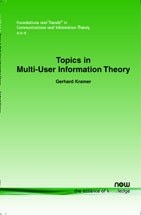Topics in Multi-User Information Theory
By Gerhard Kramer, Bell Laboratories, Alcatel-Lucent, USA, gkr@bell-labs.com
Abstract
This survey reviews fundamental concepts of multi-user information theory. Starting with typical sequences, the survey builds up knowledge on random coding, binning, superposition coding, and capacity converses by introducing progressively more sophisticated tools for a selection of source and channel models. The problems addressed include: Source Coding; Rate-Distortion and Multiple Descriptions; Capacity-Cost; The Slepian–Wolf Problem; The Wyner-Ziv Problem; The Gelfand-Pinsker Problem; The Broadcast Channel; The Multiaccess Channel; The Relay Channel; The Multiple Relay Channel; and The Multiaccess Channel with Generalized Feedback. The survey also includes a review of basic probability and information theory.
Topics in Multi-User Information Theory
Topics in Multi-User Information Theory presents a review of eleven of the fundamental issues in multi-user information theory. Each chapter is devoted to one particular issue and follows the same structure. Each chapter starts with a problem description and then describes solutions to the problem for general and specific cases. The book uses a tutorial style and the text motivates the reader to study the subject matter further for himself or herself. The organization builds up knowledge from chapter to chapter rather than collecting all closely-related facts in one place. The selection of topics includes: Typical Sequences and Source Coding; Rate-Distortion and Multiple Descriptions; Capacity-Cost; The Slepian-Wolf Problem; The Wyner-Ziv Problem; The Gelfand-Pinsker Problem; The Broadcast Channel; The Multiaccess Channel; The Relay Channel; The Multiple Relay Channel; and The Multiaccess Channel with Generalized Feedback.
Topics in Multi-User Information Theory provides the reader with a concise overview of the most important topics of source and channel coding. It is an invaluable resource for students and researchers working in information theory and communications.
